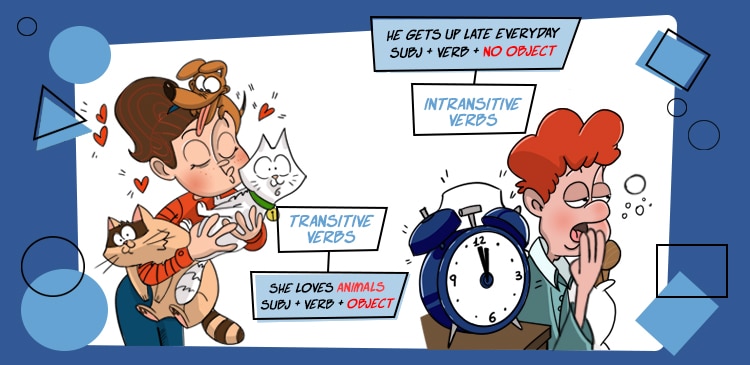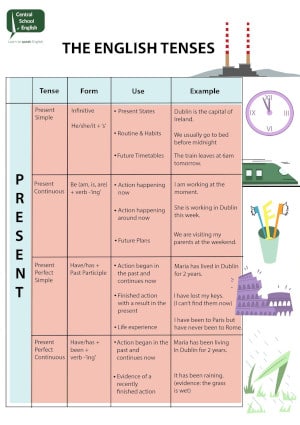Transitive and Intransitive Verbs

Hello there! This blog post is going to look at an aspect of Verbs in English which is often overlooked: The fact that there are two different ‘types’ of verb in English – namely Transitive and Intransitive verbs.
You may never have heard of these terms before, but don’t worry! This isn’t as complicated as it might appear at first!
The following sections will deal with each type of verb in turn, with examples to show you how they are used, and a quiz for you to test your knowledge!
Onwards!
Transitive Verbs
So let us begin by talking about transitive verbs. These are verbs which are used with an object, a noun, phrase or pronoun that refers to the person or thing that is affected by the action of the verb. Basically the verb Subject does the action of the Verb to an Object (somebody or something).
For example:
She loves animals
They operate heavy machinery
Mary dislikes it
John usually eats breakfast
The verbs love, operate, dislike and eat are transitive verbs. Each verb has an object or pronoun following the verb.
Sometimes the object of a transitive verb is not stated. For example, we can say:
The children are eating.
It is obvious that the children are eating some kind of food. So although there is no object in the sentence, the verb eat is transitive here.
Here are some more examples of transitive verbs with an object that is not stated:
John reads every day.
I’m going to cook this evening.
She’s an excellent guitarist. She plays very well.
In these sentences the verbs have an object that is not stated.
Intransitive Verbs
Moving on to intransitive verbs and as you may have guessed, the difference is that intransitive verbs don’t have an object. In simple terms, the verb Subject does the Verb action. There is no object that receives the action.
For example:
The baby was crying.
He gets up late everyday.
We talked for hours.
They laughed hysterically.
The verbs be, get up, talk and laugh are intransitive verbs. In these sentences no object receives an action.
Transitive and Intransitive Verbs
Transitive verbs are used with an object
I finished my book last night = I (subject) finished (verb) my book (object)
Intransitive verbs don’t use an object
The sun rises early in Summer. = The sun (subject) rises (verb)
Some verbs can be both Transitive and Intransitive
One thing that can make understanding transitive or intransitive verbs complicated is that in English verbs can sometimes be used in both ways! This just means that in some contexts a verb does have an object (and is therefore transitive) and in other contexts the verb doesn’t have an object (and is thus intransitive).
For example:
Move
We moved the chairs. – transitive – it has an object (the chairs)
The dancers moved slowly. – intransitive – it has no object
Grow
We grow tomatoes in the garden. – transitive – it has an object (tomatoes)
The children are growing quickly. – intransitive – it has no object
Taste
Sara tasted the soup. – transitive – it has an object (the soup)
The soup tasted delicious. – intransitive – it has no object
Run
Dave runs his own business. – transitive – it has an object (his own business)
We ran to the station. – intransitive – it has no object
Some Verbs which can be both Transitive and Intransitive
Start – Change – Close – Open – Eat – Drink – Read – Stop – Set – Write – Cook …
Transitive and Intransitive verbs video
Test Yourself
Are the verbs in italics in the following sentences transitive or intransitive?
Vocabulary
To overlook: Ignore or to not consider
Onwards: Forwards
Thus: Therefore, in this way
To imply: To show/suggest/indicate that something exists but without directly referring to it
Thank you for reading our post. You’ll find more English grammar tips elsewhere on our site and if you’d like information on our English courses in Dublin, please do not hesitate to contact us.






